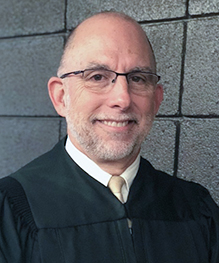 TOPEKA—District Judge David Rogers of the 31st Judicial District has been appointed to sit with the Kansas Supreme Court to hear oral arguments in one case on the court's December 12 docket. After hearing oral arguments, Rogers will join Supreme Court justices in their deliberations and decision drafting.
TOPEKA—District Judge David Rogers of the 31st Judicial District has been appointed to sit with the Kansas Supreme Court to hear oral arguments in one case on the court's December 12 docket. After hearing oral arguments, Rogers will join Supreme Court justices in their deliberations and decision drafting.
“I am pleased that District Judge Rogers is taking time from his duties in the 31st Judicial District to sit with the Supreme Court,” said Chief Justice Lawton Nuss. “It's a great help to our court, and we look forward to his contributions in deliberating and eventually deciding this case.”
Rogers has been a district judge since 2005. He regularly hears cases in Wilson and Woodson counties of the 31st Judicial District, which also is composed of Allen and Neosho counties.
“It is a great honor to be asked to sit with the Supreme Court, and I am very appreciative of the opportunity and look forward to serving the people of Kansas in this manner,” Rogers said.
Rogers is a lifelong Wilson County resident. He graduated from Fredonia High School in 1977, Kansas State University in 1981, and the University of Kansas School of Law in 1984. He practiced with his father, Steven Rogers, in private practice from 1984 to 2005. He also served as municipal court judge in Fredonia.
All Supreme Court oral arguments are webcast live through the Watch Supreme Court Live! link of the Kansas judicial branch website at www.kscourts.org.
The case Rogers will hear is the first one scheduled on the 9 a.m. docket December 12:
Appeal No.114,937: Marilyn K. Parsons v. Jon M. King and The Trust Company of Kansas
Leavenworth County: (Petition for Review) The Trust Company of Kansas employed King, a Kansas-licensed attorney, as a trust officer. TCK policy prohibited employees from practicing law during employment. Unaware of TCK's policy, King continued to represent Parsons before, during, and after his employment with TCK. While employed with TCK, King transferred funds from Parsons' TCK account to pay himself for legal fees. TCK was unaware of this until the end of King's employment, at which point it filed a complaint of suspected elder abuse with the Kansas Department of Social and Rehabilitation Services and an ethical complaint with the Office of the Disciplinary Administrator. Parsons then sued TCK and King. The jury found TCK liable for negligent failure to train but not liable for any of the other claims against TCK, including negligent supervision of King. TCK raised three issues in the Court of Appeals: 1) there was insufficient evidence to support the verdict; 2) the district court should have granted TCK's motion for judgment as a matter of law; and 3) the jury was improperly instructed on TCK's failure to train King. The Court of Appeals reversed and remanded to the district court by finding the evidence was insufficient to support the verdict for negligent failure to train and the district court should have granted TCK's post-trial motion for judgment as a matter of law. Issues on appeal are whether: 1) there is sufficient evidence of TCK's negligent training to support the jury's verdict; 2) the jury's verdict is reasonably within the jury's purview of the evidence presented; and 3) the district court's denial of the motion for judgment as a matter of law should be affirmed on appeal.